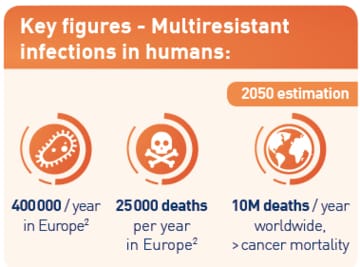
AMR in Europe
Antibiotic resistance, a real challenge in veterinary medicine
Antibiotic resistance is a very real threat of increasing importance in veterinary practices globally.
Inappropriate use of antibiotics is a contributing factor, often caused by a lack of awareness and lack of practical guidelines to refer to. With the GRAM book, vets have now a practical guide to help them in their daily practice.
Why is antibiotic resistance so important? Because it's a universal concern. Antibiotic-resistant bacteria can pass from our pets to our families and inversely. That’s why resistance to antibiotics threatens the health of our pets and our families.
During the 2016 BSAVA GRAM conference, three veterinary experts of the GRAM European consensus panel provided a snapshot of the current situation in their respective countries:
Veterinary prescription habits in:


Dr Chiara Noli
DVM, Dip ECVD Dermatology
Turin, Italy
Veterinary practitioners in Italy frequently use so-called last-resort antibiotics as first- line treatment. For example, “over 50% of antibiotics used by Italian veterinarians to treat urinary tract infections in their patients are so-called last-resort antibiotics”, reported Dr Chiara Noli, a referral veterinary dermatologist. “They also rarely carry out culture and sensitivity testing.” And the consequences are evident. “I am increasingly faced with animals suffering from multidrug- resistant infections, and we’re often struggling to find an antibiotic that is working. This is a huge problem for referral dermatologists, and recently also seen by first-opinion practice."


Dr Constança Pomba
DVM, PhD Internal Medicine
Lisbon, Portugal
Antimicrobial resistance in Portugal is reaching alarming levels – and not just in human medicine. Veterinary prescription habits of antibiotics “could be better” according to Dr Constança Pomba. “In Portugal, fluoroquinolones represent some 10% of all antimicrobial tablets for companion animals”, she announced, referring to the 2013 report of the European Surveillance of Veterinary Antimicrobial Consumption. And of all prescribed penicillins for companion animals, in Portugal “just about 100% of these are potentiated pencillins containing ß-lactamase inhibitors such as clavulanic acid ”. She applauded the production of the GRAM initiative. “We need to protect our antibiotics”, she stressed.


Dr Tim Nuttall
Bsc, BVSc, CertVD, PhD, Cbiol, MSB, MRCVS Dermatology
Edinburgh, UK
“Around 40% of companion animal consultations result in antibiotics being prescribed”, announced Dr Tim Nuttall, citing data from the SAVSNET surveillance network in the UK. Studies show that fluoroquinolones and third-generation cephalosporins are used in up to 13% of cases. In 20% of cases the dose was higher than the recommended dose and in 5% of cases it was lower. Another worrying finding was that in 23,5% of cases of acute diarrhoea, antibiotics had been prescribed although they are rarely indicated in this condition.





